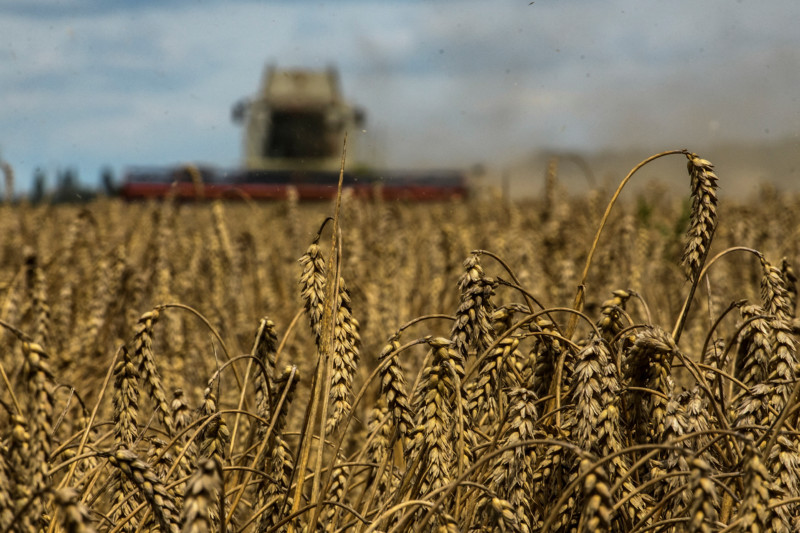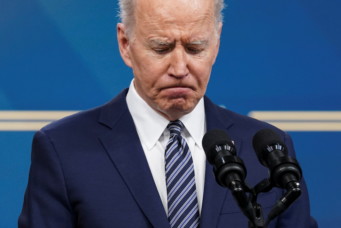Ukraine’s Economic Shocks in Egypt
Political economist Amr Adly discusses the state of the Egyptian economy and others around the world, describing current vulnerabilities and emphasizing the need for climate justice

A wheat in a field near the village of Zghurivka, in the Kyiv region. The ongoing war on Ukraine has disrupted the supply of its wheat to the world, August 9, 2022. Viacheslav Musiienko/Reuters
The Russian invasion of Ukraine has shaken the world in many ways. One of its most shocking effects has been on the economic level, where supply chains have been disrupted, the trade of basic food staples—especially wheat—severely hampered, and a shadow of uncertainty cast upon the international economic order.
Countries like Egypt that are highly dependent on imports—particularly when it comes to food security, as well as frequent reliance on global creditors and foreign inflows—have been affected by the war in ways which require a serious reconsideration of current political-economic models.
The Cairo Review’s Deputy Senior Editor Omar Auf sat down with Amr Adly, who is also a professor of political economy at the American University in Cairo, to discuss the effects of the Ukraine War on Egypt especially: what weaknesses exist in our current food and economic systems, what are the sequence of events which served as precursors to the current crisis, and how can we look at future prospects.
CR: What does the Ukraine War tell us about our global economic model, especially regarding food security, supply chains, and related mechanisms?
AA: Economic crises that result from such major geopolitical events reveal the weaknesses that are already there. And that, of course, is no exception to Egypt. We have seen this specifically in Western Europe, as well as Central and Eastern Europe even more so with their very pronounced dependence on Russian gas. And that applies pretty much to North Africa and the Middle East, as well as significant parts of Africa that have developed this auto-dependency on importing staples from Russia and Ukraine, or from both.
So, on the one hand, yes, we have this revealing stance, but on the other, we also have the transformative potential that is usually there when such big crises happen. And this is something that we have seen, for instance, with the revised energy policies, revised patterns of regional integration within as well as around the periphery of Europe . . . something that might create some opportunities for North Africa.
CR: What weaknesses have specifically been exacerbated by the ongoing conflict?
AA: I think that we have two main weaknesses. One of them, of course, is food dependency. And I’m not sure that we [Egypt] can do much about it, because we already need to have some of the highest productivity per acre worldwide. The main problem in Southwest Asia and North Africa is that they are some of the most arid regions in the world. And hence, we have limitations on natural resources on arable land that is available for cultivation as well as supply of fresh fruit, especially with global warming, etcetera. And hence, the only rule that is left really is to adjust to the global economic changes by defining what is to be cultivated and what is not to be cultivated.
So for the past thirty years, the Egyptian agricultural sector has been reoriented to fit as a producer of fruits and vegetables that are primarily directed to export— for exploitation—to Europe. This might be revised now, of course, if we decide to cultivate more wheat, for instance, instead of being dependent on importing it, or at least not to such a great extent. So when it comes to the exact composition of what is being produced, it is something that is definitely left for agriculture and policy making. But otherwise, I don’t see much big room for change, given the demographic as well as natural limitations that this part of the world really faces and has been facing for a very long time.
The other form of vulnerability is more indirect because it has to do with the turmoil that hit financial markets in the wake of the war in Ukraine and that did not result only from the Ukraine War. It also has to do a lot with the earlier outbreak of COVID-19. The measures that were taken, especially in the United States—the expansionary policies that were adopted led to a very huge supply of dollars that eventually translated into higher inflation. And then you have the issue of supply shortage or the assumption of supply shortage resulting from the war, especially in raw materials, the rising energy prices, all of these fueling inflation on a global scale more and more.
And at this very moment, Egypt has been dependent on short-term financial inflows in order to rebuild our reserves, to be able to fill in the financing gap of the money that we need that is not in dollars, and to meet our commitment—especially when it comes to the inflated importance and the ability of the economy to generate foreign currency and especially in dollars. This made us quite vulnerable together with thirty or forty other countries, some of which are low to medium income, some of which are medium income, and some of which are low income. But you have this problem with a credit crunch, to a great extent, that is taking its toll on the external position of many of these economies as well as their internal workings.
CR: Since you described a credit crunch, how do you view the recent IMF agreement with Egypt? Are these the structural steps Egypt needs to address, as you said with the over-bloated import bill and our structural weaknesses in general, or are there other measures we need to take?
AA: The very short answer is no. It [the IMF-suggested structural reforms] cannot solve our problems. Why? Because the IMF to start with is not responsible. It’s not within its mandate, by the way, to restructure Egypt’s external economy, a sector of or its economy as a whole. The IMF at the end of the day is a monetary fund that extends money in times of need to its member countries. And that’s it. The problem is that this is the third time we have resorted to the IMF in less than seven years. By the way, that’s something that indicates that whichever measures were taken [in the past], proved to be very short fixes. [They] proved to be not the remedy needed for structural weaknesses.
So, if we trace the structural weakness to the fact that our imports are almost 2.5 times our exports, and that we have a problem with the generation of dollars that we need in order to keep the economy going, then this would require the development and implementation of a coherent industrial policy . . . which will divert resources away from non-tradable sectors like real estate, housing, and so on, that have been driving economic growth in the past four decades. And that would raise questions about the institutional challenges that exist in coordinating this between the state and businesses. So the IMF team is not going to deliver this, it’s not expected to deliver this. These are short fixes. The problem is that we deal with short fixes as if they were long-term ones and they are not—by definition, they are not. And that’s why we ended up having a deal with the IMF and then running into trouble just a couple of years afterwards.
CR: You mentioned Egypt should adopt an industrial-based policy. What do you see as the model for our transformation?
AA: It’s very hard to give a clear answer to this because devising such a policy and implementing it is something that is by definition multilateral. Academics or experts, you name them, will only be one single ingredient in that bigger recipe, where we have business people who have workers and you have local communities, and we have the state. In a way, this is really the investment in institutional arrangements through which we can come up with ideas and then pursue them.
But I think that overall, we will be significantly closer to some smart model of import replacement. Smart in the sense of something that is not inefficient. But at the same time, counting on the classical models—as they were called once by a leading economist ‘fetishes of the Washington Consensus’—like export-led growth and foreign direct investment, is not going to deliver at this moment. It doesn’t make any sense if the leading exporting nations, like China for instance, are facing a very uncertain global economic context with a trade war with the United States and [geopolitical struggles] are coming up again with rising nationalism. How is it possible that this is going to be the strategy—that was devised in the 1990s, by the way, when things looked much better for everyone? Nowadays, they don’t look as good for anyone. So, at least we need to recognize this.
CR: Taking a step back, how do you see the Ukraine War affecting Egypt in the present, but also in the future?
AA: Well, the Ukraine War is not over yet. And the ramifications of the war are not very clear yet. I think it will leave some long-term impacts on the global economy that will indirectly impact a country like Egypt, as well as many other countries that occupy similar positions in the global economy. Many of these transformations are going to result from the future ability of the global economy to remain globalized. Because here the sequence is more important than just the event of the war. This is the third major hit to the global economy, especially in terms of global investment, like global capital flows and trade, following COVID-19 and before that the 2008–09 financial meltdown from which the global economy never recovered. By the way, this is something that many people just overlook. But it’s extremely important [to note] that until even 2019, before the COVID-19 pandemic, global trade as a percentage of the world’s GDP, as well as global, foreign direct investment inflows, were not close to where they were in 2007. So the world never recovered. And when it’s being hit more and more, I think that eventually we will end up in a world that is less globalized in terms of trade. And this, I think, will create its own troubles as well as its own opportunities in some areas, but it will result in some reorientation, and it’s already happening.
There’s the fact that you have not necessarily governments in the Global South reorienting their policies, but creditors, for instance, reorienting their policies, their money. These are the partners in the Global North, who are more powerful in setting rules and then implementing them. I think that these changes are not clear yet. But to try to express it briefly: we are most probably ending up in a world that is de-globalized, meaning less globalized than it used to be.
CR: So how do you see the future interactions between politics, economics, environmental policy and our reliance on fossil fuels, especially considering that the Ukraine War exposed [the world’s] heavy reliance on fossil fuels? And how does Egypt factor into this in terms of opportunities we can take advantage of?
AA: As a political economist, I think that the problem is not technological, meaning that technology does not grow on trees. I mean, the issue is that technology is not an exogenous factor that we have fossil fuels, and then the way out will be the development of more efficient ways of using them or [through] renewable energy, for instance. Many of these are important, but they have to be seen as part of a broader political-economic setting. And here, it becomes a question of environmental justice to a great extent, because a country like Egypt, which is one of those impacted by climate change, is either doing a lot in addressing this, or is not expected to do a lot because its footprint is not that big anyway.
And then it becomes clear that because of the huge gap in income, and consumption patterns between the Global North and the Global South, people that don’t actually consume much are severely affected by climate change.
Take Pakistan, for instance, where you have [it] very tragically express[ed] with no footprint whatsoever, even though it’s a country of almost 250 million people but it’s so poor to the extent that people don’t consume that much at all. And yet, it’s a country where one-third of the total surface got submerged—so that’s one of the things here that are alarming.
And even if we think of cases like China, for instance, we don’t really understand this—the hyper-industrialization in China, without considering China’s dependency on U.S. markets for the production of consumer goods. At the end of the day, we have consumption that is so unevenly distributed, to the extent that without addressing justice and just expressing the whole thing in terms of technology defeats the purpose.
I think that COP27 here [in Egypt] has [put it in those terms]—we are at a deadlock. This deadlock has to do with the fact that the political economy part is not likely to be recognized by everyone, especially the richer parts of the world. This would definitely impact the mitigation [of climate crises] as well as the policies that need to change in the Global North more so than in the Global South—I will say in the Global North plus China mainly, that happen to together make up 60 percent of the world GDP anyway.
Our record as a humanity in coordinating beyond nation states, [taking] big steps, is not very encouraging. And I hope that we are not locked eventually into a tragedy of the commons situation, because we seem to be pretty much heading in that direction. I mean, [for instance because of] the inability to act, so I’m not very optimistic.
The only thing that makes me a bit optimistic is that nowadays the environment has become very central to the discourse on public policy, on political economy, and this was not the case twenty years ago. So that means that despite all of these hurdles to coordinate something, global civil society has managed to create a discourse that is nowadays occupying the center stage. This is an encouraging thought.
CR: You’re saying that justice is not only important on a political level, but it is actually efficient on an economic level . . .
AA: I think it’s sine qua non for any collective action to address climate change. It’s not a luxury, it’s not to legitimize actions, no, it’s really a precondition for any action to take place.





